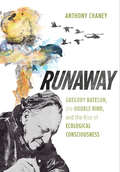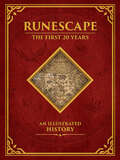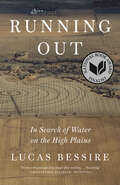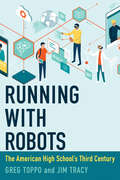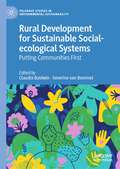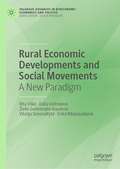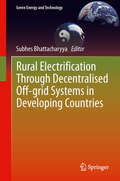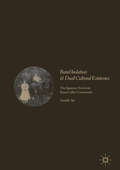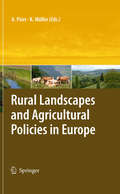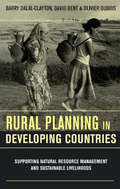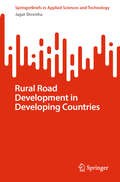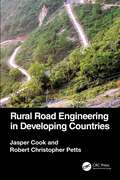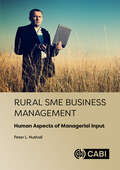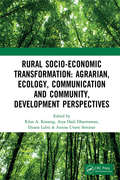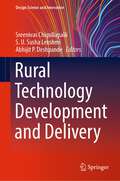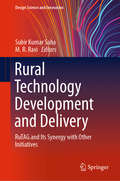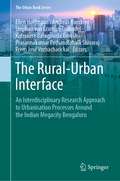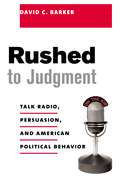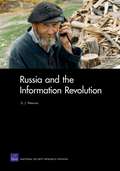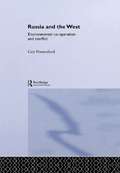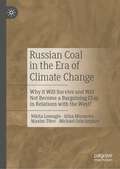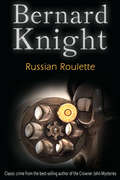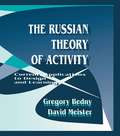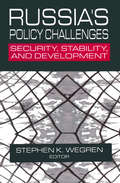- Table View
- List View
Runaway: Gregory Bateson, the Double Bind, and the Rise of Ecological Consciousness
by Anthony ChaneyThe anthropologist Gregory Bateson has been called a lost giant of twentieth-century thought. In the years following World War II, Bateson was among the group of mathematicians, engineers, and social scientists who laid the theoretical foundations of the information age. In Palo Alto in 1956, he introduced the double-bind theory of schizophrenia. By the sixties, he was in Hawaii studying dolphin communication. Bateson's discipline hopping made established experts wary, but he found an audience open to his ideas in a generation of rebellious youth. To a gathering of counterculturalists and revolutionaries in 1967 London, Bateson was the first to warn of a "greenhouse effect" that could lead to runaway climate change.Blending intellectual biography with an ambitious reappraisal of the 1960s, Anthony Chaney uses Bateson's life and work to explore the idea that a postmodern ecological consciousness is the true legacy of the decade. Surrounded by voices calling for liberation of all kinds, Bateson spoke of limitation and dependence. But he also offered an affirming new picture of human beings and their place in the world—as ecologies knit together in a fabric of meaning that, said Bateson, "we might as well call Mind."
Runescape: The First 20 Years--An Illustrated History
by Alex Calvin JagExA full-colour hardcover companion tome that offers a look behind the scenes as the iconic online fantasy RPG celebrates its 20th birthday!In 2001, RuneScape transformed the world of MMORPGs with a magical world that was free-to-play in your browser. Assuming any number of fantasy roles, players carved their own adventures in a fantasy land filled with vibrant characters, daring adventure and mystery. In an industry where success can often be short lived, RuneScape has defied the odds by not just surviving, but thriving over an incredible two decades. Now you can get an insider's look at the tremendous talent and enormous effort that went into creating the land of Gielinor and the magical races who inhabit it.Jagex and Dark Horse present a guide to the history of the RuneScape franchise, exploring the detailed tapestry of RuneScape and Old School RuneScape through exciting and exclusive art and behind the scenes interviews!
Running on Sunshine: How Does Solar Energy Work? (Let's-Read-and-Find-Out Science 2)
by Carolyn Cinami DeCristofanoRead and find out about solar energy in this colorfully illustrated nonfiction picture book.The sun is a source of energy for living things. Energy that comes from sunshine is called solar energy. But how does solar energy work? And how can we use solar energy to not only stay on the cutting-edge of technology, but to help keep the environment healthy? Read and find out about solar roads that light up when there’s danger ahead, like a moose on the road—and did you know that someday tiny solar chips placed in someone’s eyes could help a blind person see? Learn all this and more!Running on Sunshine comes packed with visual aids like charts, sidebars, an infographic, and a hands-on activity—how to direct sunlight using mirrors! Both the text and the artwork were vetted for accuracy by Dr. Bart Bartlett, Associate Professor of Chemistry at the University of Michigan.This is a clear and appealing science book for early elementary age kids, both at home and in the classroom. It's a Level 2 Let's-Read-and-Find-Out, which means the book explores more challenging concepts for children in the primary grades. The 100+ titles in this leading nonfiction series are:hands-on and visualacclaimed and trustedgreat for classroomsTop 10 reasons to love LRFOs:Entertain and educate at the same timeHave appealing, child-centered topicsDevelopmentally appropriate for emerging readersFocused; answering questions instead of using survey approachEmploy engaging picture book quality illustrationsUse simple charts and graphics to improve visual literacy skillsFeature hands-on activities to engage young scientistsMeet national science education standardsWritten/illustrated by award-winning authors/illustrators & vetted by an expert in the fieldOver 130 titles in print, meeting a wide range of kids' scientific interestsBooks in this series support the Common Core Learning Standards, Next Generation Science Standards, and the Science, Technology, Engineering, and Math (STEM) standards. Let's-Read-and-Find-Out is the winner of the American Association for the Advancement of Science/Subaru Science Books & Films Prize for Outstanding Science Series.
Running Out: In Search of Water on the High Plains
by Lucas BessireFinalist for the National Book AwardAn intimate reckoning with aquifer depletion in America's heartlandThe Ogallala aquifer has nourished life on the American Great Plains for millennia. But less than a century of unsustainable irrigation farming has taxed much of the aquifer beyond repair. The imminent depletion of the Ogallala and other aquifers around the world is a defining planetary crisis of our times. Running Out offers a uniquely personal account of aquifer depletion and the deeper layers through which it gains meaning and force.Anthropologist Lucas Bessire journeyed back to western Kansas, where five generations of his family lived as irrigation farmers and ranchers, to try to make sense of this vital resource and its loss. His search for water across the drying High Plains brings the reader face to face with the stark realities of industrial agriculture, eroding democratic norms, and surreal interpretations of a looming disaster. Yet the destination is far from predictable, as the book seeks to move beyond the words and genres through which destruction is often known. Instead, this journey into the morass of eradication offers a series of unexpected discoveries about what it means to inherit the troubled legacies of the past and how we can take responsibility for a more inclusive, sustainable future.An urgent and unsettling meditation on environmental change, Running Out is a revelatory account of family, complicity, loss, and what it means to find your way back home.
Running with Robots: The American High School's Third Century
by Greg Toppo Jim TracyHow the technological changes that are reshaping the future of work will transform the American high school as well.What will high school education look like in twenty years? High school students are educated today to take their places in a knowledge economy. But the knowledge economy, based on the assumption that information is a scarce and precious commodity, is giving way to an economy in which information is ubiquitous, digital, and machine-generated. In Running with Robots, Greg Toppo and Jim Tracy show how the technological advances that are already changing the world of work will transform the American high school as well.Toppo and Tracy--a journalist and an education leader, respectively--look at developments in artificial intelligence and other fields that promise to bring us not only driverless cars but doctorless patients, lawyerless clients, and possibly even teacherless students. They visit schools from New York City to Iowa that have begun preparing for this new world. Toppo and Tracy intersperse these reports from the present with bulletins from the future, telling the story of a high school principal who, Rip Van Winkle-style, sleeps for twenty years and, upon awakening in 2040, can hardly believe his eyes: the principal's amazingly efficient assistant is a robot, calculation is outsourced to computers, and students, grouped by competence and not grade level, focus on the conceptual. The lesson to be learned from both the present and the book's thought-experiment future: human and robotic skillsets are complementary, not in competition. We can run with robots, not against them.
Rural Development for Sustainable Social-ecological Systems: Putting Communities First (Palgrave Studies in Environmental Sustainability)
by Claudia Baldwin Séverine Van BommelThis book provides an overview of interdisciplinary approaches that have applied social science to research focused on issues around food, agriculture and natural resource management. The book demonstrates that those who work in rural sociology either as researchers or practitioners apply community development and participatory techniques to socio-environmental interaction. The book discusses how the evolving concept of interconnected social and ecological systems (SES) emerged, recognizing the inherent complexity, adaptive nature, and resilience of such systems. This book engages with contemporary theory, as well as new cutting-edge transdisciplinary research evidenced in case studies from three continents.
Rural Economic Developments and Social Movements: A New Paradigm (Palgrave Advances in Bioeconomy: Economics and Policies)
by Rita Vilkė Dalia Vidickienė Živilė Gedminaitė-Raudonė Vitalija Simonaitytė Erika RibašauskienėFocusing on the demands of the new innovative, sustainable and inclusive rural development paradigm, the monograph raises the discussion regarding new approaches and success factors that are vital in current rural socio-economic development and policy transformations. The bottom-up policymaking, self-organization, creative use of knowledge in rural areas, and many other rural innovations are aligned in this book with new social movements’ theories, which help disclose, explore and explain the rural development paradigm shift. Rural development forces of the 21st century center on the agents of change - rural population, and, surprisingly - urban population(!), and the political debate concerning EU Common Agricultural Policy and European Green Deal, illustrated with multiple case studies. This book will be of interest to a broad audience of readers, keen on scientific, political, and practical issues of innovations in rural areas and their future development pathways. The monograph is authored by a team of scholars from the Lithuanian Centre for Social Sciences, Institute of Economics and Rural Development, Department of Rural Development.
Rural Electrification Through Decentralised Off-grid Systems in Developing Countries
by Subhes BhattacharyyaMore than 1.3 billion people worldwide lack access to electricity. Although extension of the electricity grid remains the preferred mode of electrification, off-grid electrification can offer a solution to such cases. Rural Electrification through Decentralised Off-grid Systems in Developing Countries provides a review of rural electrification experiences with an emphasis on off-grid electrification and presents business-related aspects including participatory arrangements, financing, and regulatory governance. Organized in three parts, Rural Electrification through Decentralised Off-grid Systems in Developing Countries provides comprehensive coverage and state-of-the art reviews which appraise the reader of the latest trend in the thinking. The first part presents the background information on electricity access, discusses the developmental implications of lack of electricity infrastructure and provides a review of alternative off-grid technologies. The second part presents a review of experiences from various regions (South Asia, China, Africa, South East Asia and South America). Finally, the third part deals with business dimensions and covers participatory business models, funding challenges for electrification and regulatory and governance issues. Based on the research carried out under the EPSRC/ DfID funded research grant for off-grid electrification in South Asia, Rural Electrification through Decentralised Off-grid Systems in Developing Countries provides a multi-disciplinary perspective of the rural electrification challenge through off-grid systems. Providing a practical introduction for students, this is also a key reference for engineers and governing bodies working with off-grid electrification.
Rural Isolation and Dual Cultural Existence
by David K. AbeThis book studies the Japanese-American coffee farmers in Kona, Hawaii. Specifically, it sheds light on the role of first and second generation immigrants in the emergence of the Kona coffee agricultural economy, as well as factors that contributed to the creation of the Japanese community in Kona. The people there have survived much turmoil, including harsh treatment on the sugar plantations, economic instability, Pearl Harbor and racial stigma, and ethnic and religious identity crises. Despite these challenges, the pillars of the Japanese coffee community have remained stable.
Rural Landscapes and Agricultural Policies in Europe
by Annette Piorr Klaus MüllerThe reform of the European agricultural policy aims at stimulating the development of European towards more sustainability and more competitiveness in global markets, by ensuring environmental soundness, supporting rural viability and better meeting consumers demands. Parallel to this farming in the ever growing EU is undergoing major changes. The conditions for production are occurring faster than ever, including developments such as climate change, new markets (bioenenergy), structural changes and ageing rural societies. Agriculture in an ever changing Europe has to develop multifunctional regional strategies. About 40 scientists from 11 European research institutions compiled this joint publication to provide an overview of concepts and approaches for multi functionality impact assessment, which includes surveys on societal demands in different parts of Europe. A central part presents research results on the impact of current agricultural policies and future scenarios, assessed by micro-economic and environmental modeling procedures (agent based, linear programming, trade-offs). They provide information on the issues of how and why farmers in varying structural and geophysical frameworks respond to the new CAP (Common Agricultural Policies) reform. One large chapter specifies the developments in 7 case study regions in Denmark, France, Germany, Hungary, Italy, Poland and Slovakia.
Rural Planning in Developing Countries: Supporting Natural Resource Management and Sustainable Livelihoods
by David Dent Olivier Dubois Barry Dalal-ClaytonThis book provides an international perspective on rural planning, focused on developing countries. It examines conventional development planning and innovative local planning approaches, drawing together lessons from recent experience of rural planning and land use. The authors examine past and current practice and ways that land use planning and management of natural resources can underpin sustainable local livelihoods. They draw on case studies from Africa, Asia and Latin America to present findings relevant throughout the developing world.
Rural Road Development in Developing Countries (SpringerBriefs in Applied Sciences and Technology)
by Jagat ShresthaThis book provides guidelines for the planning, design and construction of rural roads in hilly regions. It is a useful resource for researchers and practitioners working in the field as it presents different rural road network concepts for new construction and upgrades of existing infrastructure. the book introduces the covering-based rural road network method that discovers nodal points to cover settlements and public facilities within a given region by developing a basic rural network. It also explores different mathematical models including a multi-objective approach for solving a rural road network upgrading problem for typical rural road network structures for hilly regions. It also presents case studies to help readers grasp the basic principles presented in the text. This book can also additionally be utilised as a reference resource for graduate and undergraduate students interested in rural transportation.
Rural Road Engineering in Developing Countries
by Jasper Cook Robert Christopher PettsRural Road Engineering in Developing Countries provides a comprehensive coverage of the planning, design, construction, and maintenance of rural roads in developing countries and emerging nations. It covers a wide range of technical and non-technical problems that may confront road engineers working in the developing world, focusing on rural roads which provide important links from villages and farms to markets and offer the public access to health, education, and other services essential for sustainable development. Most textbooks on road engineering are based on experience in industrialised countries with temperate climates or deal only with specific issues, with many aspects of the design and construction of roads in developing regions stemming from inappropriate research undertaken in Europe and the USA. These approaches are frequently unsuitable and unsustainable for rural road network environments, particularly in low to middle income countries. This book takes on board a more recent research and application focus on rural roads, integrating it for a broad range of readers to access current information on good practice for sustainable road engineering in developing countries. The book particularly suits transportation engineers, development professionals, and graduate students in civil engineering.
Rural SME Business Management: Human Aspects of Managerial Input
by Peter L NuthallThis book is about managerial ability and how it might be assessed and improved, and it focuses on rural Small and Medium Enterprises (SMEs). Traditionally, business studies have seldom covered the manager as a person and a decision maker in any great depth. Personnel management, production economics, financing, operations analysis techniques, etc. tend to be emphasized but the personal attributes of the decision makers have as much influence on success as the rules of good decision making. This book aims to correct this imbalance. The human characteristics of managers that define how a manager operates are explored, as are their impact on managerial ability. The details of the competencies a manager must possess are also presented and discussed as well as potential detracting biases. The book concludes with methods and techniques covering personal characteristic changes and associated managerial improvement. The concepts and conclusions of this book are all based on a body of research, excerpts of which are quoted in the text, drawn from the rich sources available in the international literature. Case studies describing successful managers and management advisors are used throughout. · First book which specifically focuses on human factors and decision making for SME managers. · Introduces new research specifically on the quantification of intuition, the primary decision making method used in SMEs. · Contains essential material required by researchers of decision making processes, business studies teachers, and extension workers from the world of SME business.
Rural Socio-Economic Transformation: Proceedings of the International Confernece on Rural Socio-Economic Transformation: Agrarian, Ecology, Communication and Community Development Perspectives (RUSET 2018), November 14-15, 2018, Bogor, West Java, Indonesia
by Rilus A. Kinseng, Arya Hadi Dharmawan, Djuara Lubis, Annisa Utami SeminarMost of Indonesian population live in rural areas, and the majority of poor people also live in rural areas, namely 13.47% in rural and 7.26 in urban. In the past decades, rural communities as well as the ecology have changed fundamentally. Many factors contribute to this transformation: development programs from the government as well as from private and NGOs; the diffusion of information technology; the development of transportation facilities; the rise of education and health levels, interaction with "outsiders", and so on. A main driving factor for rural development has been agrarian liberalization. This can be seen in the development of transnational plantations, which trigger land grab and rise of land demand. Development trough liberalization also had a negative impact, since the development of modern and industrialized agriculture affected the environment, and the expansion of plantations caused changes in the agricultural systems of villages and the life orientation of local communities. Interventions in villages by private companies, intermediary institutions no doubt have brought a structural transformations in rural live: local institutions, livelihood systems, population structures, ecosystems, and relation to the land. Unfortunately, the social, economic, cultural, and ecological transformation of the rural community not always produces improvement of quality of life for the rural community. At the same time, information and data related to rural transformations are scarcely available at research institutions, universities, NGOs, private enterprises. Rural Socio-Economic Transformation: Agrarian, Ecology, Communication and Community, Development Perspectives discusses many aspects of the social, economic, cultural, and ecological transformation of rural life in Indonesia, and is of interest to academics and policy makers interested or involved in these areas.
Rural Technology Development and Delivery (Design Science and Innovation)
by Sreenivas Chigullapalli S. U. Susha Lekshmi Abhijit P. DeshpandeThis book comprises the proceedings of the 2nd international conference on Rural Technology Development and Delivery organized by Rural Technology Action group Indian Institute of Technology (IIT) Madras. The book highlights research on demand driven technologies and innovations, mostly on energy, environment, water resources, livelihood and smart technologies for the development of rural India. Spanning multi-disciplinary research aspects on rural technologies and development, this book would be useful for rural entrepreneurs, researchers, students and academic/R&D institutions for getting them involved in appropriate rural technology and development.
Rural Technology Development and Delivery: RuTAG and Its Synergy with Other Initiatives (Design Science and Innovation)
by Subir Kumar Saha M. R. RaviThis book comprises the proceedings of a rural technologies conference organised by the Rural Technology Action Group (RuTAG), which was conceptualized and initiated by Principal Scientific Adviser (PSA) to the Government of India R. Chidambaram in 2003–04. The book highlights case studies and research into providing science and technology interventions for the development of rural areas. Covering various aspects of research carried out in the area of rural technologies, it offers a valuable resource for researchers, professionals, and policymakers alike.
The Rural-Urban Interface: An Interdisciplinary Research Approach to Urbanisation Processes Around the Indian Megacity Bengaluru (The Urban Book Series)
by Ellen Hoffmann Andreas Buerkert Stephan von Cramon-Taubadel Kotrakere Basegowda Umesh Prasannakumar Pethandlahalli Shivaraj Prem José VazhacharickalBengaluru is one of the fastest growing megacities in India. As such, it provides an in-situ laboratory for studying rural-urban transitions. While urbanization is most evident in the changing landscape with increasing built-up areas, it comes along with changes in ecosystem functions, new economic opportunities, changes in social organization and individual attitudes and behavior. All of these processes are interlinked and mutually depend on each other. This book attempts to integrate studies from a wide scope of disciplinary perspectives and at different spatial scales under the framework of complex social-ecological systems.Agriculture is the prime example of a system in which humans interact with their biophysical environment, and the production systems in the rural-urban interface are profoundly affected by urbanisation. Intensification and diversification of agriculture are immediate responses to urban pressures and demands, and are linked as much to resource (over-)use as to commercialisation. Yet, little is known about the spatial patterns of agricultural transformation in areas of urban sprawl.The focus of the contributions here is explicitly on the interface, in-between the rural and urban systems. It thus differs from the urban-centered perspective of city planners as well as from the rural predominance in most of the agricultural research. In the present volume this focus is implemented by analysing samples along a spatial gradient representing different stages of urbanization. Ongoing time series analyses and a panel study will complement the spatial approach by a temporal dimension.
Rushed to Judgment: Talk Radio, Persuasion, and American Political Behavior (Power, Conflict, and Democracy: American Politics Into the 21st Century)
by David BarkerConvenient, entertaining, and provocative, talk radio today is unapologetically ideological. Focusing on Rush Limbaugh—the medium's most influential talk show—Rushed to Judgment systematically examines the politics of persuasion at play on our nation's radio airwaves and asks a series of important questions. Does listening to talk radio change the way people think about politics, or are listeners' attitudes a function of the self-selecting nature of the audience? Does talk radio enhance understanding of public issues or serve as a breeding ground for misunderstanding? Can talk radio serve as an agent of deliberative democracy, spurring Americans to open, public debate? Or will talk radio only aggravate the divisive partisanship many Americans decry in poll after poll? The time is ripe to evaluate the effects of a medium whose influence has yet to be fully reckoned with.
Russia and the Information Revolution
by D. J. PetersonThis work, the result of a six-year study, sheds light on Russia's role in the global Information Revolution. It examines Russia's increasing reliance on information and communications technologies (IT) to improve its government institutions, modernize business and industry and stimulate economic growth, broaden information access, and enhance the quality of life for Russian people. The author examines Russia's emerging IT sector, how businesses in Russia are seeking to use IT to enhance productivity and profitability, the impact of IT on government, and the course of the Information Revolution in Russian society.
Russia and the West: Environmental Co-operation and Conflict (Environmental Politics)
by Geir HønnelandHønneland assesses current environmental discourses and applies this analysis to look at the relations between Russia and the West with regards to environment problems. It includes three in-depth case-studies on environmental problems, living marine resources, nuclear safety and air pollution.
Russian Coal in the Era of Climate Change: Why it Will Survive and Will Not Become a Bargaining Chip in Relations with the West?
by Nikita Lomagin Irina Mironova Maxim Titov Michael OshchepkovThe Russian coal sector today faces challenges in the form of global decarbonization, sanctions, and difficulties in retaining market access and competitiveness. This new market environment warrants an examination of what lessons can be drawn from the past tribulations of one of Russia’s most iconic and strategically important industries. This book analyzes the Russian coal industry developments in historical and political contexts, including those of energy transition. The key tenets of contemporary dialogue between Russia and those who advocate for a speedy energy transition to phase out coal are presented. The book addresses the question of the coal industry as a sacrifice for the sake of Russia’s rapprochement with the West. The contribution of this book, therefore, is filling the gap between two large research inquiries – climate change mitigation and energy transition on the one hand, and the existing large coal industry of a given country on the other.
Russian Roulette: The Sixties Crime Series (The\sixties Crime Ser. #4)
by Bernard KnightA classic murder mystery by acclaimed crime writer Bernard Knight, set in London and Moscow at the height of the Cold War. Simon Smith, an ex-Army man with a gift for languages, is drafted in by a shady businessman to do some ‘work’ in the USSR. Simon thinks it’ll be an easy job with an ample reward…but what with multiple murders, beautiful femmes fatale, and devious master criminals, it’s not as simple as he’d hoped! Meanwhile, the Russian detectives set to trail a suspected thief have all their expectations confounded… A thrilling tale of international politics and police work on the other side of the ‘Iron Curtain’.
The Russian Theory of Activity: Current Applications To Design and Learning (Applied Psychology Series)
by Gregory Bedny David MeisterThe opening of the former Soviet Union to the West has provided an opportunity to describe Russian human factors/ergonomics and to compare American theories and methods with it. Although this book is principally dedicated to describing the theory of activity as it applies to issues of design and training, it is also offered to a general audience of psychologists and interested lay readers. This theory studies the goal-directed behavior of man and attempts to integrate the cognitive, motivational, and behavioral aspects of activity into a holistic system. Such fundamental notions as goal, action, and self-regulation are described and analyzed from totally different theoretical points of view. This is the first comprehensive, systematic description of the theory of activity in the English language. Existing attempts to translate the theory of activity into English suffer from certain limitations. Among them, the theory of activity -- considered one of the more important accomplishments of Soviet psychological science -- has an extensive history dating back to the work of Vygotsky and his students. Subsequent development of the theory by other well-known Soviet psychologists and psychophysiologists took place within different schools with some significant differences. In the former Soviet Union, psychological theory could not be advanced unconnected to Marxist-Leninist ideology. Accordingly, theoretical formulations were subject to their own version of "political correctness." Books published in this field were addressed only to other scientists with backgrounds in the field. Moreover, the translation of the technical terms in Russian psychology frequently resist translation in the absence of the context of the debates in which they were being used. Thus, simple translation of books in this field as they were written in a specialized and politicized environment for Russian audiences is really not a particularly sensible or worthwhile undertaking. This book is addressed in the first instance to Western psychologists. It compares, among other things, analyses of work from the former Soviet Union with the work from the West. Applications of activity theory to design and learning were paramount in the Soviet Union. Using their own theoretical perspective, the authors provide a comparative analysis of the various schools working in activity theory. They hope that this book may facilitate the exchange of ideas between Russian psychological scientists and Western psychologists working in ergonomics, human factors, industrial/organizational psychology, education, learning, and related areas where the theory of activity may find general application. This book's authors attempt to provide a contribution not only to science but also to history. Western researchers have strongly influenced Russian work, but because of negative political pressure in the former USSR, the flow of concepts was one-sided. Russian ergonomists received so much from American and Western sources that it is now important to give something back. Despite the considerable similarity between Russian and American theories and methods, the special "spin" the former put on their work may stimulate new thinking on the part of their American colleagues.
Russia's Policy Challenges: Security, Stability and Development
by Stephen K. WegrenDesigned for use in courses on contemporary Russia, this volume explores Russia's policy dilemmas in three realms: international security, socio-political, and socio-economic. In each of these categories, Russia faces daunting problems, none of which is likely to be resolved quickly or easily. Yet, over the longer term, the extent to which policymakers are successful in dealing with these challenges will go far in determining Russia's future place in the world, how Russians will live, and what kind of country Russia becomes. Each expertly authored chapter outlines the nature of one major issue; traces it evolution and policy developments under the Yeltsin and Putin presidencies; and evaluates the effectiveness and prospects of efforts to come to grips with the challenge.
